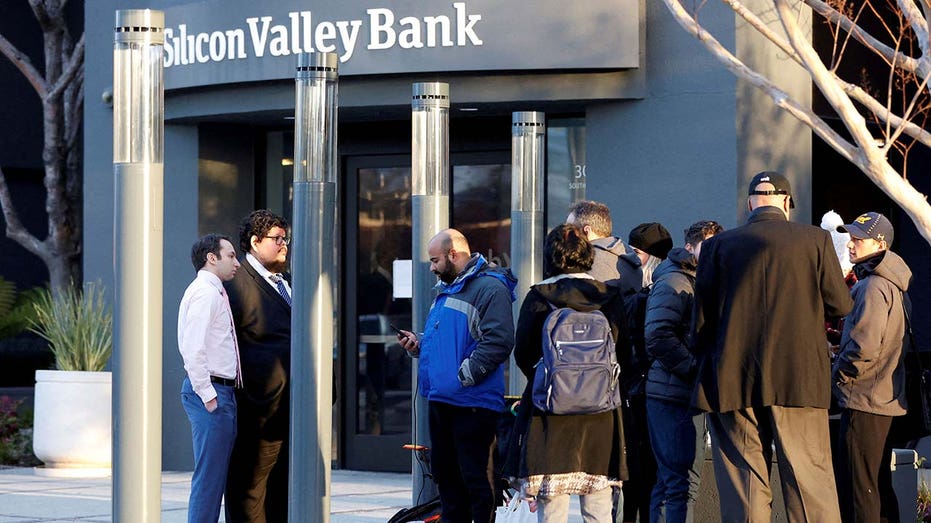FDIC wants big lenders to shoulder Silicon Valley, Signature bank busts
FDIC's special assessment would apply to banks with over $5 billion in assets starting in the first quarter of 2024
Banking concerns are ‘overdone’: Jay Woods
Freedom Capital Markets chief global strategist Jay Woods tells ‘Cavuto: Coast to Coast’ that if the banks stabilize, the ‘rebound’ can be quick as stocks fall on renewed bank worries.
The Federal Deposit Insurance Corporation (FDIC) on Thursday proposed a special assessment of the largest U.S. banks to recover the funds used to protect uninsured depositors who otherwise would’ve been left holding the bag following the failures of Silicon Valley Bank (SVB) and Signature Bank.
The proposed special assessment would recoup the $15.8 billion paid out from the FDIC’s Deposit Insurance Fund to protect depositors in SVB and Signature who had deposits in excess of the $250,000 insurance threshold. It would do so by imposing a fee of 0.125% – or 12.5 basis points – on insured deposits at banks with $5 billion in assets or more, which would remain in effect for eight quarterly assessment periods starting in the first quarter of 2024.
The FDIC estimates that about 113 banks will be subject to the fee and that banks with more than $50 billion in total assets will pay about 95% of the special assessment, while those with less than $5 billion will be exempt.
"The proposal applies the special assessment to the types of banking organizations that benefited most from the protection of uninsured depositors, while ensuring equitable, transparent, and consistent treatment based on amounts of uninsured deposits," said FDIC Chairman Martin Gruenberg. "The proposal also promotes maintenance of liquidity, which will allow institutions to continue to meet the credit needs of the U.S. economy."
FDIC ENLISTS BLACKROCK TO CLEAN UP BANKING CASTOFFS

The Federal Deposit Insurance Corporation is imposing a special assessment fee on larger banks to replenish an insurance fund that was tapped following the failures of Silicon Valley Bank and Signature Bank. (AP Photo/Peter Morgan / AP Newsroom)
Under the Federal Deposit Insurance Act, the FDIC is required to impose an assessment fee on banks to recover funds paid out from the Deposit Insurance Fund whenever a systemic risk designation is invoked by regulators amid a banking crisis.
The proposed assessment has to go through the federal rulemaking process, which includes a 60-day public comment period after the proposal appears in the Federal Register. It Is also subject to revision before it is finalized if changes are made to the loss estimates, mergers or failures occur, or the reported estimates of uninsured deposits.
WILL FIRST REPUBLIC BE THE LAST BANK RESCUED AMID BANKING CRISIS?

Signature Bank failed in March and was acquired by New York Community Bank in a $2.7 billion deal. (AP Photo/Bobby Caina Calvan / AP Newsroom)
SVB and Signature Bank both had relatively large amounts of uninsured deposits at the end of last year which made them vulnerable to collapse when depositors moved to withdraw their funds. SVB’s uninsured deposits were roughly 93% of its total deposits at the end of last year, while Signature’s amounted to 89% of its deposit base at that time according to regulatory filings.
The failure of those banks and the structure of the FDIC’s special assessment means that the nation’s largest banks – including the likes of JPMorgan Chase, Bank of America and Wells Fargo – will have to foot the bill. FOX Business reached out to those three institutions for this story, and they either declined to comment or did not respond prior to the deadline.
FDIC LOOKS TO CHANGE DEPOSIT INSURANCE POLICY FOLLOWING FIRST REPUBLIC FAILURE

Silicon Valley Bank failed in March and was acquired by First Citizens Bank for over $16 billion. (REUTERS/Brittany Hosea-Small / Fox News)
The American Bankers Association, which is one of the nation’s largest financial sector trade groups, said in a statement from President and CEO Rob Nichols, "While we are still reviewing the details of the proposed special assessment, including the methodology and the dissenting votes, we appreciate the FDIC’s decision to exclude most community banks."
"Once we receive input from our members, we will be prepared to provide industry feedback to the FDIC on the special assessment, the timing of the expense, and the ongoing increase in quarterly Deposit Insurance Fund assessments on banks," Nichols added.
Independent Community Bankers of America (ICBA) President and CEO Rebeca Romero Rainey said in a statement that, "ICBA and the nation’s community banks commend the FDIC for today’s proposal to exempt the vast majority of community banks from its special assessment following the recent failures of Silicon Valley Bank and Signature Bank of New York – which we’ve advocated since the immediate aftermath of these large bank failures."
| Ticker | Security | Last | Change | Change % |
|---|---|---|---|---|
| JPM | JPMORGAN CHASE & CO. | 322.09 | -0.11 | -0.03% |
| WFC | WELLS FARGO & CO. | 94.63 | +0.70 | +0.75% |
| BAC | BANK OF AMERICA CORP. | 56.37 | -0.18 | -0.32% |
GET FOX BUSINESS ON THE GO BY CLICKING HERE
"As ICBA has repeatedly said, including in a letter to FDIC Chairman Martin Gruenberg, community banks should not have to bear any financial responsibility for losses to the Deposit Insurance Fund caused by the miscalculations of large financial institutions," Romero Rainey added. "Large banks should pay for the special assessment because they are the chief beneficiaries of these two receiverships."




















